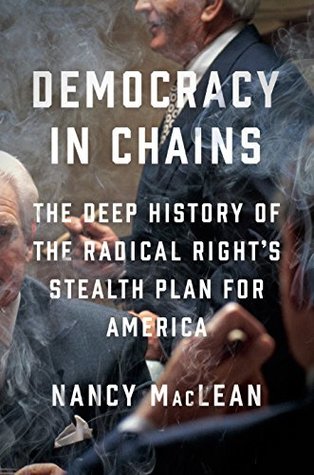More on this book
Community
Kindle Notes & Highlights
Read between
July 18 - July 25, 2020
example, the economist prophesies lower-income parts of America “recreating a Mexico-like or Brazil-like environment” complete with favelas like those in Rio de Janeiro.
The “quality of water” might not be what U.S. citizens are used to, but “partial shantytowns” would satisfy the need for cheaper housing as “wage polarization” grows and government shrinks. “Some version of Texas—and then some—is the future for a lot of us,” the economist advises. “Get ready.”
Thom Tillis, a North Carolina state senator elevated to the U.S. Senate in 2014 with backing from the Koch apparatus, has said that restaurants should be able “to opt out of” laws requiring employees to wash their hands after using the toilet, “as long as they post a sign that says, ‘We don’t require our employees to wash their hands after leaving the restroom.’ The market will take care of that.”
The largely African American population of Flint, Michigan, knows firsthand what will happen to “people who fall by the wayside” in the new political economy run by people who think this way. The Flint scandal broke because of a mother who would not give in. When she appealed to the appointed city manager and Republican governor in late 2014 because her daughter’s hair was falling out, her older son was suffering abdominal pain, and her twins were developing untreatable rashes, they brushed aside her concerns.
attributable to the prodding of the Mackinac Center, one of the first Koch-funded—and in this case, Koch-staffed—state-level “think and do” tanks that now exist in all fifty states and are affiliated with the State Policy Network (SPN), also Koch-concocted, to coordinate efforts to prevent state governments from responding to the demands of the “takers.”
The powers of these unelected managers to impose austerity measures would be vast, including the authority to unilaterally abrogate collective bargaining agreements, outsource services, sell off local resources to private companies, and change suppliers at will.
The Koch team by then could count on its Club for Growth to fund primary challenges to ensure that the party line on environmentalism would be maintained by Republican members of Congress. That explains why Senator John McCain is but the best-known—and once most principled—Republican to flip his position after being faced with a Tea Party primary challenge.
To put all this another way: if the Koch-network-funded academics and institutions were not in the conversation, the public would have little doubt that the evidence of science is overwhelming and government action to prevent further global warming is urgent.36 Sadly, however, their campaigns are working. The number of Americans who believed that “the continued burning of fossil fuels would alter the climate” dropped from 71 percent in 2007 to 44 percent in 2011.37
Rather than admit their ideological commitment to ending public education, they have convinced a sizable segment of the American population that the problems in schools today are the result of those teachers’ unions having too much power.
A large body of research by economists and political scientists over the past two decades has demonstrated that the surging inequality on display in America today is not an inevitable result of impersonal developments such as globalization and new technology, even as these have contributed. Rather, the extremity of our current situation is in good part due to the outsized power of corporations and wealthy donors over our politics and public policy.
At midcentury, the former slave states of the South led the nation in passing antiunion right-to-work laws, with only a smattering of imitators elsewhere, mostly in places of sparse population. Yet between 2012 and 2016, guided by Buchanan’s ideas and pushed by the Koch-funded organizations ALEC, the SPN, and Americans for Prosperity, four former free states passed such laws: Indiana, Michigan, Wisconsin, and West Virginia.
But the elderly, too, and those now aging will have plenty of problems of their own. Social Security offers another tragic illustration of the destructive import of privatization and “personal responsibility,” with Chile’s experience again hinting at America’s future. Our nation’s retirement system is “the soft underbelly of the welfare state,” leading cadre member Stephen Moore has said. “Jab your spear through that” and you can kill the whole thing.
Pushed by market pressures and encouraged by Mont Pelerin Society thought, U.S. corporations have nearly all discontinued the defined benefit pensions that a generation ago covered half the labor force.


